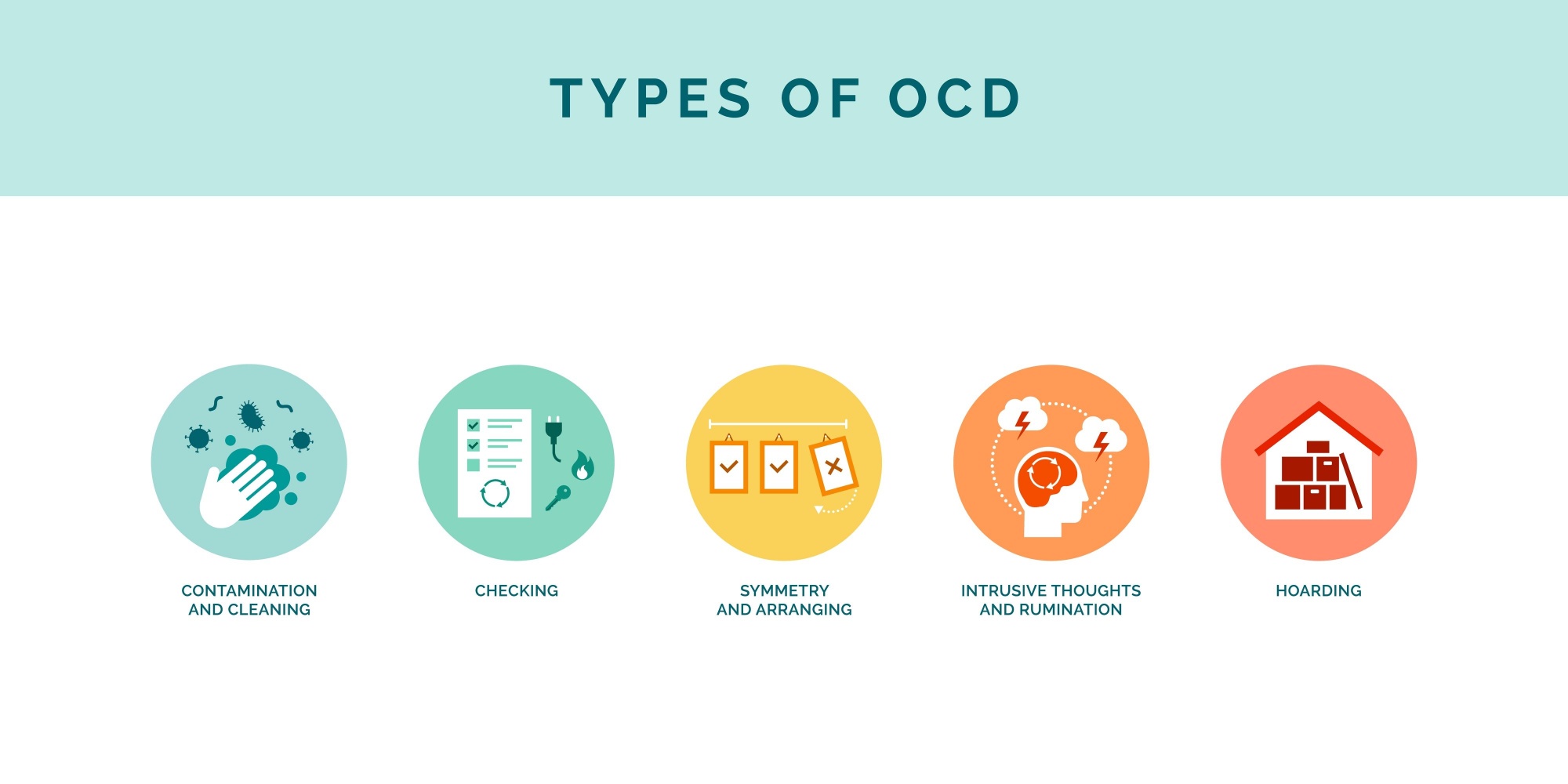What's On This Page?
ToggleEver find yourself caught in a mental loop, with obsessive thoughts? You’re not alone. They are a common issue, affecting millions of people worldwide. Sometimes it is part of having OCD (obsessive-compulsive disorder), but it isn’t always the case. According to the Anxiety and Depression Association of America, obsessive-compulsive disorder (OCD) affects approximately 2.2 million adults in the United States alone. However, it’s not just those diagnosed with OCD who struggle; many of us experience bouts of obsessive thinking, especially during stressful times.
Sometimes it’s just frequently thinking about a significant life decision, like “I want to quit my job, should I?” and you spin that around in your head for weeks, months… maybe even years! This is common and doesn’t necessarily indicate OCD. This kind of obsessive thinking might just be the mind’s way of processing important choices. It can involve weighing pros and cons, considering future scenarios, or even just ruminating over the same concerns repeatedly.
In this blog, we will delve into both natural and conventional approaches to managing obsessive thoughts. From lifestyle changes and herbal remedies to medications and therapy, a range of strategies can help you find relief and reclaim your peace of mind. But most of all, I want to make sure you know that a qualified professional needs to be involved if you have serious obsessive thoughts or OCD – you can’t self-treat when it’s serious. Let’s drill down on this now.

Understanding Obsessive Thoughts
Obsessive thoughts are unwanted and intrusive thoughts that can cause significant anxiety. They may be associated with OCD, but not always. They often revolve around fears, doubts, or the need for perfection and can be quite distressing. Understanding the triggers and causes of these thoughts is crucial in addressing them effectively.
Here are five real-life examples:
- Fear of Contamination: Constantly worrying about germs, dirt, or being contaminated by touching objects others have touched. This can lead to excessive hand washing or cleaning.
- Doubting Safety: Repeatedly worrying that you forgot to lock the door or turn off the stove, which can compel someone to check multiple times, even if it interrupts their daily activities.
- Aggressive or Harmful Thoughts: Having violent or aggressive thoughts towards others or oneself. For example, obsessively worrying about hurting a loved one accidentally or on purpose, despite not wanting to.
- Need for Symmetry or Exactness: An overwhelming need to arrange objects to face a certain way or be in a perfect order, which can be time-consuming and interfere with daily life.
- Forbidden or Taboo Thoughts: Intrusive thoughts about socially unacceptable or taboo subjects, such as sexual or religious thoughts, which might be contrary to one’s values or beliefs, causing distress and confusion.

Understanding the Roots of Obsessive Thoughts
Obsessive thoughts often stem from various underlying causes, each requiring a tailored approach to treatment. Let’s explore these causes and what conventional doctors might recommend to manage them effectively:
- Stress and Anxiety: High levels of stress and anxiety can trap you in a loop of obsessive thinking, making it difficult to break free. Conventional doctors might prescribe Selective Serotonin Reuptake Inhibitors (SSRIs) like sertraline (Zoloft) or escitalopram (Lexapro), which help regulate serotonin levels and reduce anxiety. My other article offers 5 Tips to Boost Serotonin.The goal is to increase low levels of serotonin. Chocolate is a popular treat that does that, and there are other foods rich in tryptophan that help you make serotonin. See below for a graphic displaying those tryptophan-rich foods.
Benzodiazepines, such as lorazepam (Ativan) or alprazolam (Xanax), may also be recommended for short-term relief, though they are not suitable for long-term use due to the risk of dependency. - Perfectionism: The relentless pursuit of perfection can lead to persistent, obsessive thoughts about making mistakes or not measuring up. For individuals where perfectionism significantly impacts daily life, SSRIs like fluoxetine (Prozac) may be prescribed to help manage the associated anxiety and obsessive thinking. Additionally, Cognitive Behavioral Therapy (CBT) is often recommended to help patients develop healthier thought patterns and coping strategies.
- Trauma: Past traumatic experiences can manifest as recurring, intrusive thoughts, causing considerable distress. In such cases, a conventional doctor might suggest a combination of medication and therapy. SSRIs like paroxetine (Paxil) or sertraline (Zoloft) are often used to manage symptoms of Post-Traumatic Stress Disorder (PTSD), alongside trauma-focused therapies like Eye Movement Desensitization and Reprocessing (EMDR). HERE.There are clinical trials going on right now as of August 2024 on the use of PTSD – you can learn more in my other ARTICLE.
- Genetics: A family history of obsessive-compulsive tendencies can increase the likelihood of experiencing these thoughts. For individuals with a genetic predisposition, doctors often recommend SSRIs as a first-line treatment. In more severe cases, Tricyclic Antidepressants (TCAs) such as clomipramine (Anafranil) may be prescribed, particularly if SSRIs are not effective. Genetic counseling and family therapy can also provide additional support and understanding of the condition.
5. Brain Chemistry: Imbalances in neurotransmitters, like serotonin, can contribute to the development of obsessive thinking patterns. To address these imbalances, SSRIs are commonly prescribed, as they help increase serotonin levels in the brain, thereby reducing obsessive thoughts and anxiety. In cases where SSRIs are insufficient, Serotonin-Norepinephrine Reuptake Inhibitors (SNRIs) like venlafaxine (Effexor®) might be considered. Additionally, a comprehensive evaluation may lead to the use of atypical antipsychotics like risperidone (Risperdal®) or quetiapine (Seroquel®) as adjunctive treatments to enhance the effects of primary medications.
Medication is just one part of a comprehensive treatment plan and it’s not always my first choice. Conventional doctors often recommend combining pharmacological treatments with therapies such as CBT or Acceptance and Commitment Therapy (ACT) to achieve the best outcomes. ACT is a type of psychotherapy that helps a person to accept their thoughts and feelings (but without judgment), and process the difficult emotions. It’s nothing new in terms of what it does. But the integrated approach of ACT, combined with medicine and natural remedies will address various aspects of obsessive thinking.
Recognizing the root causes of your obsessive thoughts is the first step towards finding effective solutions. Or maybe it’s admitting that you have them as the first step, but let’s not debate which is the “first” step. Instead, I’d like to explore some natural remedies that can help manage these intrusive thoughts.
Natural Remedies for Obsessive Thoughts
1. Mindfulness and Meditation
Practicing mindfulness and meditation can empower you to gain control over your thoughts. By focusing on the present moment and observing your thoughts without judgment, you can reduce the grip they have on your mind.
- Mindfulness Meditation: Sit quietly and focus on your breath. As thoughts arise, acknowledge them without engaging and let them pass like clouds in the sky.
- Body Scan Meditation: Slowly shift your attention through different parts of your body, starting from your toes and moving upwards, to foster awareness and relaxation.
2. Exercise
Engaging in regular physical activity can significantly reduce anxiety and stress, which are major contributors to obsessive thinking.
- Aerobic Exercise: Activities such as running, cycling, and swimming can elevate your mood and decrease anxiety levels. It boosts serotonin levels.
- Yoga: This practice also increases serotonin production. Yoga as you know combines physical postures with breath control and meditation, promoting mental clarity and a sense of calmness.

3. Herbal Remedies and Supplements
Certain herbs and supplements may help balance brain chemistry and reduce anxiety.
- St. John’s Wort: Often used for mild to moderate depression and anxiety, it can be a natural aid in mood regulation. I wrote a great article on this topic, St. John’s Wort, Serotonin, And Depression Plus 6 Interactions.
- Valerian Root: Known for its calming properties, it can help promote restful sleep and reduce anxiety.
- Omega-3 Fatty Acids: These essential fats, found in fish oil, can enhance brain function and lower anxiety.
- Magnesium: This natural relaxant helps calm the nervous system, supporting overall mental well-being. THIS FORMULA is one of my best sellers. This mineral also helps with leg cramps and headaches.*
4. Cognitive Behavioral Therapy (CBT) Techniques
While traditionally a component of conventional therapy, some CBT techniques can be self-administered to manage obsessive thoughts.
- Thought Records: Document your obsessive thoughts to identify patterns or triggers.
- Cognitive Restructuring: Challenge irrational thoughts and replace them with more balanced, rational ones.
5. Relaxation Techniques
Incorporating relaxation techniques into your daily routine can alleviate stress and reduce obsessive thinking.
- Progressive Muscle Relaxation: This involves tensing and then relaxing different muscle groups to release physical tension.
- Deep Breathing Exercises: Practice deep, slow breathing to soothe your mind and body.
Conventional Medicine for Obsessive Thoughts
When natural remedies are not sufficient, conventional medicine offers various treatments to manage obsessive thoughts.
1. Medications
Certain medications can be effective in treating obsessive thoughts, especially in conditions like OCD.
- Selective Serotonin Reuptake Inhibitors (SSRIs): Medications such as fluoxetine (Prozac) and sertraline (Zoloft) can help balance serotonin levels, reducing anxiety and obsessive thoughts.
- Tricyclic Antidepressants (TCAs): Clomipramine (Anafranil) is particularly effective for OCD.
- Benzodiazepines: These are used for short-term relief of severe anxiety but are not recommended for long-term use due to the risk of dependency. Do not suddenly stop those drugs, they have to be tapered. READ THIS.
2. Cognitive Behavioral Therapy (CBT)
CBT is a highly effective treatment for obsessive thoughts, helping individuals identify and change negative thought patterns and behaviors.
- Exposure and Response Prevention (ERP): A specific form of CBT for OCD, ERP involves gradual exposure to the source of obsession and preventing the accompanying compulsion.
3. Miscellaneous Therapies
- Acceptance and Commitment Therapy (ACT): Instead of battling against those obsessive thoughts, ACT encourages you to embrace them with acceptance. It’s about acknowledging these thoughts without letting them control you, and then taking actions that reflect your true values and beliefs.
- Mindfulness-Based Stress Reduction (MBSR): This approach blends mindfulness meditation with techniques that increase your body awareness, helping you to manage stress more effectively and enhance your overall mental well-being. There are apps that can be downloaded to your phone.
Recent Research
- Study 1: Mindfulness-Based Cognitive Therapy (MBCT): A 2022 STUDY published in the Expert Review of Neurotherapeutics showed that MBCT significantly reduces obsessive thoughts and overall anxiety in individuals with OCD. This therapy, which combines mindfulness practices with cognitive techniques, was more effective compared to standard care, providing a holistic approach to managing these persistent thoughts – at least for some. It doesn’t work for everyone.
- Study 2: Omega-3 Fatty Acids and Anxiety: A recent June 2024 study published in BMC Psychiatry revealed that supplementing with omega-3 fatty acids can lead to a notable decrease in anxiety symptoms. This reduction in anxiety may also help alleviate obsessive thoughts, making omega-3s a potential natural remedy for those struggling with these issues.

Tryptophan helps you make serotonin which reduces obsessive thinking.
Practical Tips for Managing Obsessive Thoughts
Beyond specific treatments, here are some practical tips to help manage obsessive thoughts:
- Set Time Limits: Allocate a specific time each day to address your worries and stick to it.
- Stay Busy: Engage in activities that keep your mind occupied, reducing idle time for obsessive thinking.
- Put down the phone: It’s often the source of such misery and bad news alerts, so if you can put your device down, you might be able to calm the brain chemistry down.
- Social Support: Share your experiences with friends, family, or support groups for encouragement and perspective.
- Healthy Lifestyle: Maintain a balanced diet, exercise regularly, and ensure adequate sleep to support overall mental health.
- Make decisions: Indecision can trap you in endless mental loops, causing unnecessary delay and stress. It’s important to recognize that while some decisions require careful thought, not all do. Avoid rushing, but also don’t stall indefinitely. Remember, most decisions aren’t final—you can often revise your choices later. It’s better to make a decision and adjust if needed than to remain stuck in a state of indecision for weeks or even months.
Summary
While obsessive thoughts can be challenging, a variety of strategies can help manage and reduce their impact on your life. From natural remedies like mindfulness, exercise, and herbal supplements to conventional treatments such as medications and therapy, numerous options are available. Always consult with a healthcare professional to determine the best approach for your specific situation. By taking proactive steps to address obsessive thoughts, you can improve your mental well-being and enjoy a more peaceful and fulfilling life.

Suzy Cohen, has been a licensed pharmacist for over 30 years and believes the best approach to chronic illness is a combination of natural medicine and conventional. She founded her own dietary supplement company specializing in custom-formulas, some of which have patents. With a special focus on functional medicine, thyroid health and drug nutrient depletion, Suzy is the author of several related books including Thyroid Healthy, Drug Muggers, Diabetes Without Drugs, and a nationally syndicated column.



